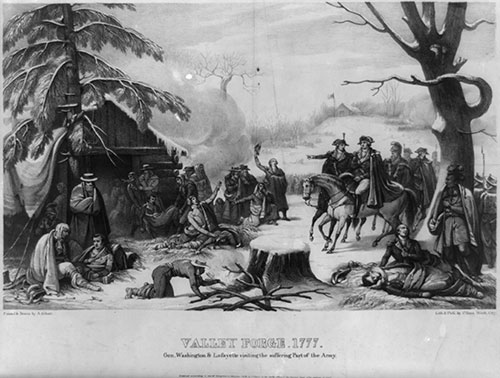Israel Angell
 Israel Angell was a descendent of Thomas Angell, an early settler of Providence. He was born August 24, 1740 in Providence, the son of Oliver and Naomi
(Smith) Angell.
Israel Angell was a descendent of Thomas Angell, an early settler of Providence. He was born August 24, 1740 in Providence, the son of Oliver and Naomi
(Smith) Angell.
Before the war, Angell served as captain of the Johnston militia company. In 1775, when the Rhode Island General Assembly formed the Army of Observation following the battles of Lexington and Concord, Angell was commissioned a major of the Providence County Regiment commanded by Colonel Daniel Hitchcock. The regiment participated in the siege of Boston, was renamed the 11th Continental Regiment, and soon after became the 2nd Rhode Island Regiment. Israel Angell was named a Lieutenant-Colonel. Upon the death of Colonel Hitchcock of tuberculosis, Angell took command of the regiment on January 13, 1777. Angell led the unit in the battles of Brandywine and Red Bank, among others. When the officers of the 1st Regiment were sent to Rhode Island to recruit in 1777, that unit merged with the 2nd Regiment. During the winter of 1777-1778 the 2nd Rhode Island was encamped at Valley Forge.
In spring of 1778, Angell was sent to Rhode Island to recruit more soldiers for the 2nd. The regiment, now under the command of Jeremiah Olney, fought at Monmouth. Then General Washington ordered the 2nd to return to Rhode Island to become part of the continental forces assembled under Major-General John Sullivan to dislodge the British army from Newport. Israel Angell resumed command of the 2nd Rhode Island during that battle.
After the Battle of Rhode Island, Angell and the 2nd were ordered to rejoin Washington’s forces. Angell earned high praise from George Washington and General Nathaniel Greene for his leadership at the Battle of Springfield in June 1780. Losses and illnesses took their toll on both the 2nd and 1st Regiments so they once again were consolidated in 1781, this time into the 1st Rhode Island Regiment which also had been ordered from Rhode Island to join Washington’s forces. This time Colonel Angell retired and returned to Johnston, Rhode Island.
To support his family--he had married three times and had 17 children--Israel Angell farmed, plied his cooper trade and became licensed as a tavern keeper. He eventually moved to Smithfield, Rhode Island where he died May 31, 1832. He was buried in the family graveyard on his farm in Johnston on the South Scituate road. In 1918 his remains were re-located to the North Burial Ground and the monument boulder put in place.
